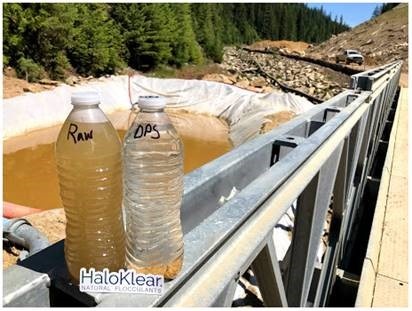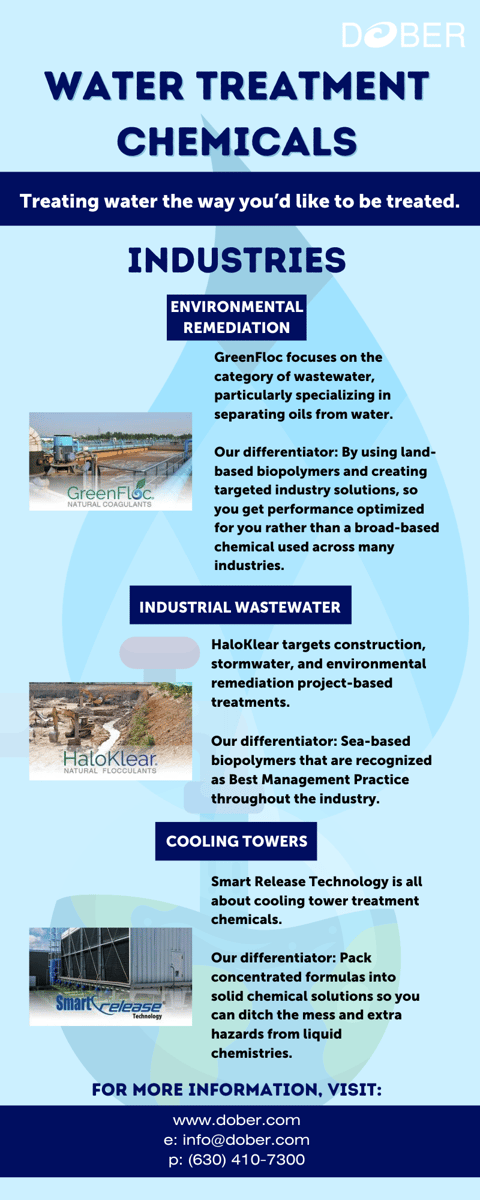Water treatment chemicals are indispensable components in the purification and conditioning of water, serving a critical role in ensuring its safety and quality for various applications. The significance of water treatment chemicals extends to both public health and industrial efficiency, making them vital for maintaining a clean and sustainable water supply.
In terms of public health, these chemicals are essential for:
- Eliminating contaminants and impurities, safeguarding water from harmful bacteria and pollutants
- Preventing the spread of waterborne diseases and ensure that it meets stringent safety standards for human consumption
- For industrial operations, they are also needed to ensure water discharged from a site meets all relevant environmental regulations
For industrial processes, the use of water treatment chemicals is paramount in preventing the formation of scale, corrosion, and other deposits that can compromise the efficiency of equipment and machinery. These chemicals aid in maintaining the integrity of pipelines, cooling towers, and other industrial systems, ensuring smooth operations and reducing maintenance costs in the long run.
Furthermore, water treatment chemicals contribute to sustainable water management by enabling the efficient use and conservation of water resources. By minimizing water wastage and optimizing water reuse through various treatment processes, they play a crucial role in promoting responsible water usage and environmental sustainability.
In summary, water treatment chemicals are crucial for maintaining public health, ensuring efficient industrial operations, and fostering sustainable water management practices. Their role in purifying and preserving water quality highlights their indispensable importance in safeguarding the health and well-being of communities and ecosystems.
Water is the most vital resource we have on this planet.
Proper water treatment is critical in maintaining our environment, both for human life as well as everything else on this planet.
From protecting environmental habitats to mitigating the spread of diseases, water treatment chemicals have a powerful role to play in the protection of life as we know it.
With that said, let's review a few water treatment industries and how water treatment chemicals play a role in their operations.
You might have heard the term "natural" or "synthetic" polymers when it comes to water treatment chemicals.
Coagulation and flocculation chemistries are versatile and could use either inorganic or organic (carbon-based) chemicals. Each of these two major categories offers characteristic environmental and economic advantages while promoting solid–liquid separation (dewatering) processes. Carbon-based water treatment polymers could be synthetic, semisynthetic, or natural polymers.
Synthetic polymers are mostly derived from petroleum or natural gas products through polymerization. They include polyacrylates, polyacrylamide, polyamines, poly DADMAACs, and poly (ethylene oxides), etc.
Meanwhile, natural polymers originate from plant or animal sources and include lignin, tannins and polysaccharides.
Semi-synthetic (sometimes called organic) polymers are produced through chemical or biological modification of natural polymers. Natural and organic polymers are currently receiving a lot of attention due to their advantages over conventional synthetic polymers or inorganic agents.
Biodegradability, non-toxicity, ability to undergo different chemical modifications and availability from renewable sources are the major advantages.
You can learn more about the chemistry behind these categories by reading Dober's Dr. Moustafa Aboushabana's excellent paper on the subject.
Industrial wastewater treatment is of paramount importance in safeguarding the environment, public health, and the sustainability of natural resources. With the continuous growth of industrial activities globally, the effective management and treatment of wastewater have become critical in minimizing environmental pollution and preserving ecological balance.
One of the primary reasons for emphasizing industrial wastewater treatment is to mitigate the adverse impact of harmful pollutants on the environment. Industrial processes often generate wastewater containing various contaminants such as:
- Heavy metals
- Toxic chemicals
- Organic compounds
If discharged untreated, these contaminants can severely pollute water bodies, soil, and air. Proper treatment processes help remove these pollutants, reducing the risk of environmental degradation and protecting the delicate ecosystems that depend on clean water sources.
Additionally, industrial wastewater treatment is crucial for ensuring the safety and health of surrounding communities.
Untreated industrial effluents can contaminate local water supplies, posing significant risks to public health through the ingestion of hazardous substances. By implementing effective treatment protocols, harmful contaminants can be removed or reduced to levels that meet regulatory standards, thereby safeguarding the health and well-being of the population living in the vicinity of industrial facilities.
Furthermore, the efficient treatment of industrial wastewater contributes to the conservation and preservation of water resources. By recycling and reusing treated water, industries can minimize their overall water consumption, thereby reducing the strain on local water sources. This sustainable approach to water management not only helps in the conservation of precious freshwater reserves but also promotes responsible industrial practices that align with global efforts towards environmental sustainability.
In summary, the importance of industrial wastewater treatment cannot be overstated. It serves as a crucial mechanism for preventing environmental pollution, safeguarding public health, and promoting the sustainable use of water resources, ultimately contributing to the overall well-being of communities and the planet as a whole.
Learn more about how Dober helps companies treat industrial wastewater.
Water treatment chemicals play a vital role in environmental remediation, serving as key agents in the purification and restoration of contaminated water bodies. As human activities continue to impact the environment, the significance of these chemicals in remediation efforts cannot be overstated, as they contribute to the reduction of harmful pollutants, the restoration of ecological balance, and the preservation of natural habitats.
One of the primary reasons for emphasizing the importance of water treatment chemicals in environmental remediation is their capacity to remove or mitigate various pollutants from water sources. These pollutants may include heavy metals, organic compounds, pesticides, and other hazardous substances that pose a threat to aquatic life and ecosystems. Through specialized treatment processes such as coagulation, flocculation, and advanced oxidation, these chemicals aid in the removal and degradation of pollutants, thereby enhancing water quality and minimizing the adverse impact on surrounding habitats.
Furthermore, water treatment chemicals play a critical role in facilitating the restoration of contaminated ecosystems. By effectively treating and cleansing water bodies, they contribute to the revitalization of aquatic habitats, enabling the resurgence of native flora and fauna. This restoration process is crucial for maintaining biodiversity, preserving natural habitats, and promoting the overall ecological balance necessary for a healthy and sustainable environment.
Moreover, the use of water treatment chemicals in environmental remediation contributes to the mitigation of long-term environmental risks. By targeting and neutralizing contaminants at their source, these chemicals help prevent the further spread of pollutants and their detrimental effects on the environment. This proactive approach not only aids in immediate remediation efforts but also establishes a foundation for sustainable environmental management and conservation practices.
In summary, water treatment chemicals play a pivotal role in environmental remediation by facilitating the removal of pollutants, the restoration of ecosystems, and the mitigation of long-term environmental risks. Their role in purifying and rejuvenating water bodies underscores their indispensable importance in safeguarding the health and sustainability of our natural environment.
In this space, we specialize in separating oil from water with GreenFloc natural coagulants.
Water treatment chemicals play a crucial role in the effective maintenance and operation of cooling towers, ensuring their optimal performance and longevity. The importance of these chemicals in cooling tower water treatment lies in their ability to:
- Prevent scale formation
- Control microbial growth
- Minimize corrosion
Doing all of the above can enhance the overall efficiency of cooling systems and reduce operational costs.
One of the primary functions of water treatment chemicals in cooling towers is to prevent the formation of scale and mineral deposits. Scale formation can impede heat transfer efficiency, leading to reduced cooling capacity and increased energy consumption. Chemical additives such as scale inhibitors and dispersants help inhibit the crystallization of minerals, keeping surfaces clean and minimizing the risk of scale buildup, thus ensuring the efficient operation of cooling towers.
Additionally, water treatment chemicals are essential for controlling microbial growth within cooling systems. The warm, moist environment of cooling towers provides an ideal breeding ground for bacteria, algae, and other microorganisms, which can lead to biofilm formation and potential equipment damage. Biocides and microbiocides are employed to inhibit the growth of harmful microorganisms, preventing biofouling and the spread of waterborne diseases, like Legionnaires disease, and maintaining the overall cleanliness and hygiene of the cooling water.
Moreover, water treatment chemicals aid in minimizing corrosion within cooling systems. Corrosion can lead to the degradation of metal components, resulting in equipment damage, leaks, and system failures. Corrosion inhibitors are used to create a protective layer on metal surfaces, reducing the likelihood of corrosion and extending the lifespan of cooling tower equipment, thus ensuring the long-term reliability and functionality of the cooling system.
In summary, water treatment chemicals play a critical role in maintaining the efficiency and integrity of cooling tower systems by preventing scale formation, controlling microbial growth, and minimizing corrosion. Their role in ensuring the smooth operation of cooling towers underscores their indispensable importance in preserving equipment functionality and reducing operational costs in industrial and commercial settings.
Water treatment is a critical part of a wide range of processes and industries. At Dober, we believe strongly in sustainable solutions, particularly in the world of water treatment.
Water is the most vital resource we have. Businesses have a responsibility to protect these vital resources, which not only serve as habitats for flora and fauna but also as water for use by humans.
Simply put, water treatment chemicals are arguably some of the most important chemicals we have in the world today. Without them, our water supplies would be significantly more polluted and harmful to life on this planet.
Want to learn more about how Dober water treatment chemicals can help your business promote a cleaner world? Reach out to us and we'd be happy to answer any water treatment chemicals questions you have.






